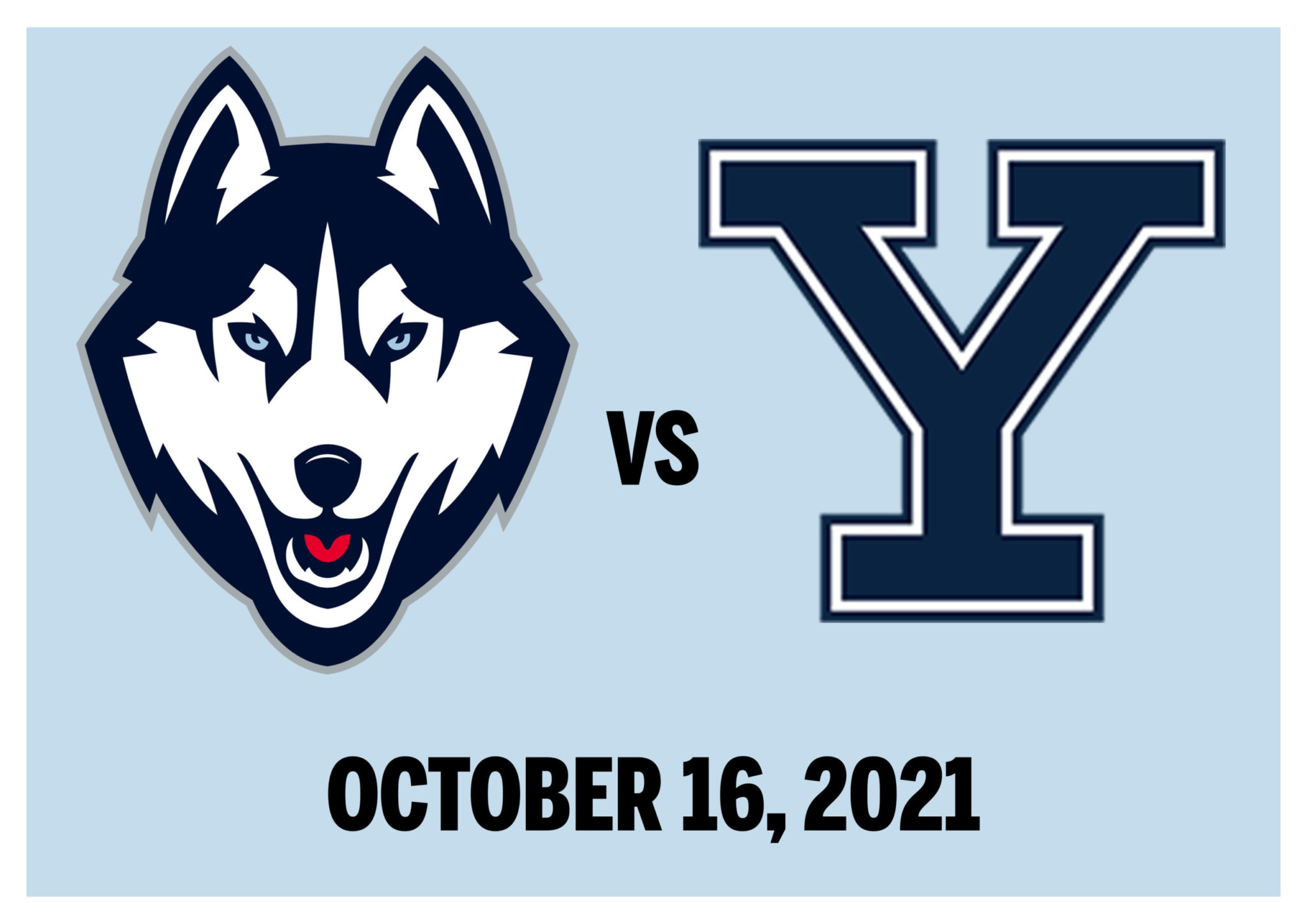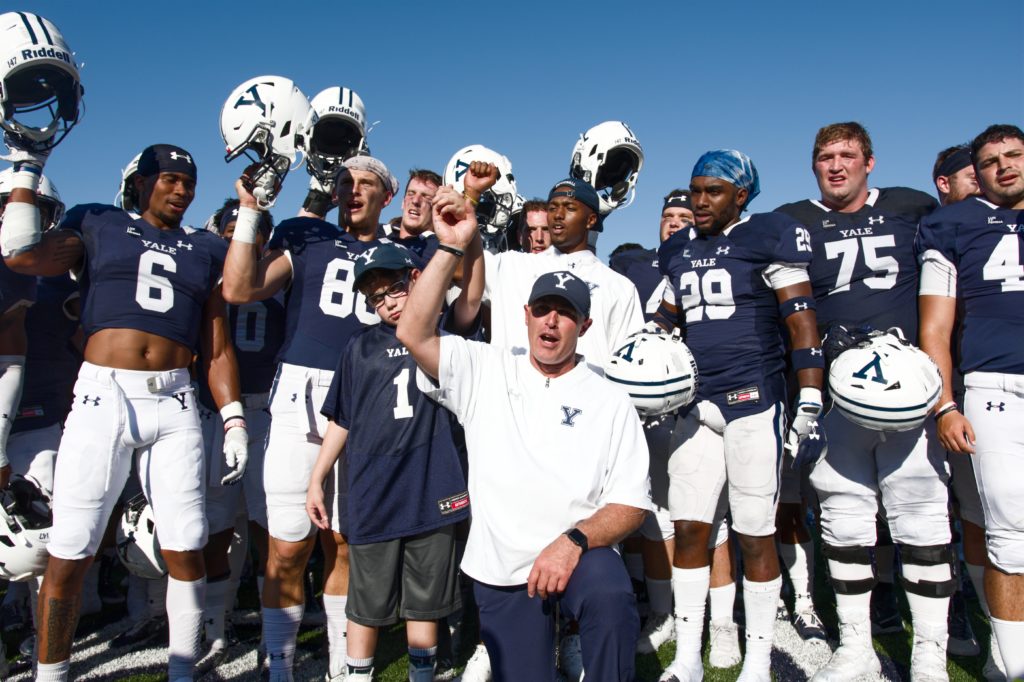FOOTBALL: Inside the Yale-UConn rivalry set to resume for the first time in two decades this fall
When the two schools meet for the 50th time at Rentschler Field in October, UConn will pay Yale $285,000, according to public records obtained by the News. Despite not playing since 1998, the in-state rivalry thrived for a half century before UConn’s divisional realignment.

Megan Graham, Production and Design Editor
In 1948, an intrastate rivalry was born.
The Yale football team, led by first-year head coach Herman Hickman, was pitted against the University of Connecticut. In the defensive battle that ensued, the Bulldogs outlasted the Huskies 7–0, much to the delight of the 25,000 home fans in attendance that afternoon at the Yale Bowl.
In the half-century that followed, each annual game added a new story to a fierce, bitter rivalry between the two programs, only for the annual matchup to cease entirely in 1998. UConn would go on to Football Bowl Subdivision, or FBS, status, while the Blue and White amassed four Ivy League titles since the last matchup. But late last year, both schools announced that for the upcoming 2021 season in the fall, Yale will face off against UConn for the first time in over two decades.
“This game is exciting for all of us because we have a world of respect for UConn,” Yale head coach Tony Reno said. “What they’ve done as a program, elevating themselves from an FCS school to an FBS school, demonstrates that they’re a highly talented team full of Division I scholarship players, so it will be a great challenge for us. It’s always exciting when two in-state schools get a chance to face off against each other.”
2021: Inside the first Yale-UConn matchup in over 20 years
Public records from UConn obtained by the News show that the two schools only have one game scheduled for now. David Benedict, UConn’s Athletic Director, told the News that there has been some conversation about playing beyond the 2021 season, but talks “haven’t moved forward at this point.”
Despite two very different paths to their planned 2021 meeting on Oct. 16 at UConn, both schools expressed excitement about renewing the rivalry. This fall’s matchup will only be the second Yale-UConn game where the Huskies will be the home team.
“When this game was officially announced back in December, we were obviously really excited that this was officially happening,” Reno said. “I think a lot of people on the outside forget that — being an Ivy school, we only have 10 weeks of play — there’s really not a lot of wiggle room to schedule in a game with an FBS team. When our administration and UConn’s Deputy Athletic Director began to have conversations about the potential for this game to happen, it eventually got to the point where potentiality became a reality, and we were able to announce it.”
Those same public records also gave insight into the financial background for the game. UConn will pay Yale a “guaranteed sum” of $285,000 for the matchup.
UConn will be the host for the first time since 1992 — a possible reason for the contract structure bringing revenue back to Yale. In both college football and basketball, larger schools will often pay mid-major teams to play in a “buy game” that guarantees the smaller school’s athletic department revenue while giving the larger school the chance to make money off tickets and capture what they hope will be a win.
The contract also specifies that Yale will receive 350 complimentary tickets and 3,000 tickets to sell. UConn’s Rentschler Field in East Hartford holds 40,000. There is also a clause protecting against “unforeseen catastrophe,” which is particularly relevant given the ongoing pandemic: “If an unforeseen catastrophe or disaster makes it impossible to play a Game by either Team, such Game shall be canceled, and neither Team shall be responsible to the other for any loss or damage.”
“If it’s a good game, a good experience, there’s a big crowd and the state’s really excited about it, why wouldn’t we play?” Benedict said. “I’d love for us to sell it out.”

1948: The origins of a 50-year rivalry
Over the course of the 34 seasons that followed the first-ever matchup that commenced this rivalry in 1948, these two programs faced one another for all but one of those years: 1951. The Elis came away victorious in 30 of the 33 games played. Yet from that point forward, Yale’s reign of utter, intrastate pre-eminence would come to a screeching halt. In 1982, UConn flipped the script instantaneously and a surge of blowout Husky victories ensued. By the time 1997 rolled around, UConn had convincingly trounced the Bulldogs in 13 of the last 15 games. Rumors quickly spread that verbal preparations for the discontinuation of the rivalry had already taken place.
That year in particular marked a watershed for the Huskies collegiate football program, and the once storied rivalry between two Nutmeg State foes would soon take an irrevocable hit. The Big East, a collegiate athletics conference that competes at the NCAA Division I-A level in football, gave the UConn program an invite to join their league. However, to accept this invitation, the Huskies Board of Trustees would have to decide whether UConn’s squad should convert to Division I-A status. The vote in favor of this upgrade was an overwhelming endorsement of sixteen to one.
As part of this metamorphosis from the FCS conference consisting of Division I-AA schools to the FBS conference made up of Division I-A schools, UConn could no longer have the Blue and White, an FCS program, on its schedule at the conclusion of the following fall season because wins against FCS schools that do not give out athletic scholarships do not count for FBS bowl game selection.
On a warm Saturday afternoon on Sept. 26, 1998, one final game was held between the two teams. In a contest that represented the culmination of a half-century-long Connecticut rivalry, the Elis were granted one final opportunity to avenge the last 15 years of crushing defeats and abject shellackings. Three hours later, Yale instead suffered its most lopsided defeat in the program’s then 116-year, 1,134-game history:
The Huskies set an early tone by scoring a touchdown on their first five possessions. By the time the scoreboard read 35-7, the Hartford Courant reported that there were more fans tailgating in the parking lots surrounding the Yale Bowl than there were in the stadium itself. When the rout had finally ended, the Blue and White had surrendered the most points, 63, in program history — a hapless feat that still stands to this day.
There is a proclivity for decades-long collegiate feuds to take on a poetic quality, and this one was no exception. When this annual matchup was first set in motion in 1948, UConn could not hold a candle to the Bulldogs. Now, exactly half a century later, it appeared obvious even to former Yale coaches that the Elis did not belong on the same field as the Huskies.
“The only thing positive is we’re not playing them again,” former Yale coach Jack Siedlecki said after the 42-point loss in 1998.
1998-2020: No matchups for the Connecticut opponents
More than two decades later, Yale and UConn are now set to square off for the 50th time. For Yale, the run has been highlighted by the Elis’ first outright Ivy League title since 1980, which they secured back in 2017. Since Yale and UConn broke off their rivalry in 1998, the Elis have only posted five seasons with a losing record.
UConn, meanwhile, has endured a tumultuous road. In the early 2010s, the Big East saw significant conference realignment. Syracuse, Pitt, Rutgers, West Virginia and Louisville all departed to Power Five football conferences like the Atlantic Coast Conference and Big Ten. In 2013, as the Big East attempted to round out the conference, a divide emerged. The seven remaining Catholic schools in the conference, colloquially referred to as the “Catholic 7,” broke off from the conference — taking the name, logo and basketball conference tournament with them. The old conference became the American Athletic Conference and as UConn’s SB Nation blog puts it, “This left UConn, the only remaining original member of the Big East, with a bunch of brand new ‘rivals’ in a conference centered on football with a geographic center in the midwest.”
Over the next few years, UConn continued to search for the elusive Power Five invite, but it never emerged. The final straw came in 2019, when the AAC signed a TV deal with ESPN and ESPN+. UConn released a public statement expressing their frustration, as the deal would sever relations between UConn and their longtime television partner SNY. Four months later, UConn would strike a deal to rejoin the Big East.
There was only one catch: the conference no longer sponsored football. The AAC had declined Connecticut’s request to stay in as a football-only program. UConn football, left out in the cold, became the seventh FBS independent school, joining Army, BYU, Liberty, New Mexico State, Notre Dame and UMass. UConn Athletic Director David Benedict has made it clear that the school has no interest in cutting the football team or dropping back down to Division 1-AA.
Consequently, UConn football has entered a period of transition, and its new identity as an independent has given it enough scheduling flexibility to set up another match with Yale. The Huskies’ 2021 schedule also features Clemson, as well as UCF and Vanderbilt, though Connecticut canceled its fall 2020 season.
“I’m happy that we are able to renew an intrastate rivalry that dates back to 1948,” Benedict told the News. “I know many of our longtime fans remember some of the great matchups of the past and are excited to see the next chapter.”
Yale’s overall record with UConn is 32–17 since the two teams first competed in 1948.
Jared Fel | jared.fel@yale.edu
Nader Granmayeh | nader.granmayeh@yale.edu







